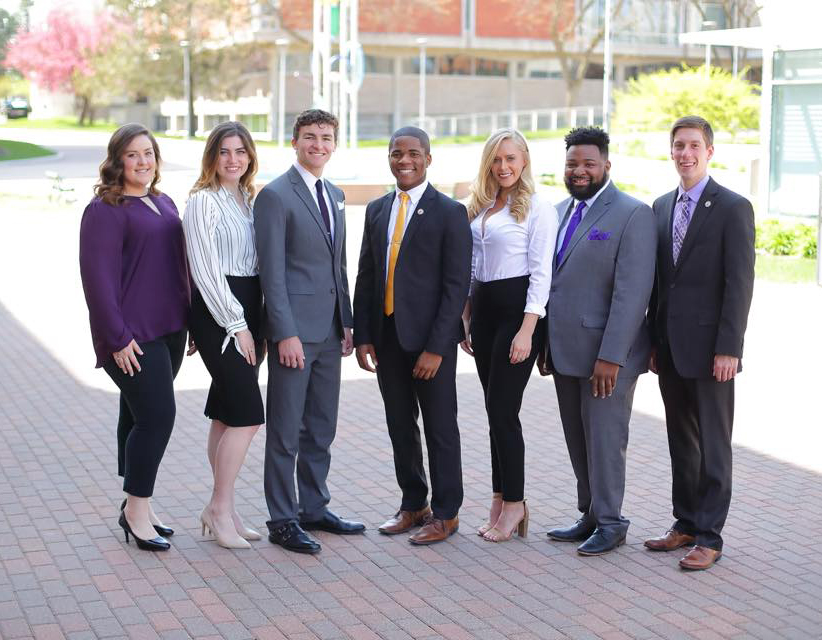NISG adds Chief of Staff position
The NISG upper cabinet consists of the directors of governmental relations, finance, public relations, diversity and the chief of staff.
Oct 26, 2017
This year, the executive branch of Northern Iowa Student Government (NISG) has grown by one member: the position of chief of staff, which was approved in a constitutional amendment last semester.
“Really, I’m just kind of a Swiss army knife for whatever [NISG] needs,” said Hunter Flesch, NISG chief of staff and former NISG president.
According to Flesch, the chief of staff takes care of administrative duties in the NISG office, records Senate meeting minutes and makes Senate bills, resolutions and executive orders public. The other main focus of the position is on monthly meetings with each of the 14 lower cabinet directors to provide support for their initiatives.
“It just makes a lot more sense in my eyes, from being in the presidential role last year, seeing how much work was dedicated to all kinds of random tasks,” Flesch said. “It seemed like it was hard to nail down the depth of the positions that you want to work in.”
Chief of staff is a compensated position, paid 10 hours per week at minimum wage. As stated in the NISG constitution, specific compensation for each individual position is approved by Senate for each upcoming term. The by-law amendment that introduced the position eliminated compensation for the speaker of the senate, which was previously a paid position.
“There’s some overlap, but it took a lot of the behind-the scenes-administrative stuff off my plate,” said Speaker of the Senate Drew Stensland.
As speaker, Stensland oversees Senate meetings, organizes bills and resolutions and sits on legislative committees. The speaker also checks in with senators to provide them with any necessary resources. The position is elected by senators before each upcoming term.
Stensland also stated that lower cabinet directors were previously paired with senators who would meet to check in on progress, but they are now overseen by the chief of staff instead. This move keeps the lower cabinet located more centrally in the executive branch.
Each lower cabinet director is focused on a specific aspect of campus life spanning a variety of areas, including residence life, LGBT issues and veteran affairs. Flesch explained that his experience as 2016-2017 NISG president allowed him to form a large network of contacts on campus, which he now uses to guide these directors towards professionals who can collaborate with them on each of their individual projects.
“What I love about the position is I get to be able to work with students who are so passionate about all kinds of issues,” Flesch said.
Last April, an amendment to the NISG constitution revived the chief of staff position, which had already existed in NISG in previous years. The move was introduced as an amendment to NISG by-laws, and then as an amendment to the NISG Constitution. Amendments to the NISG constitution must be approved by a majority of the student body.
Chief of staff, like other appointed executive branch positions in NISG, is approved by a majority vote from Senate. The chief of staff is responsible for recording Senate meeting minutes, so the amendment also eliminated the paid position of recording secretary.
NISG has seen other changes this year, as well. Stensland explained that a by-law amendment passed this semester allows unfilled Senate positions from specific colleges to be filled by at-large Senate candidates. He indicated that upcoming additions to the NISG website will keep students more up to date on current initiatives and projects.
“[Senate is] one of the few places on campus where you walk into it, and you’re able to do whatever you want with it,” Stensland said. “So whatever you’re passionate about, you can work on that.”
Flesch stated that NISG has also been focusing on establishing a visible presence on campus through newsletters and other public communication.
“I’d say, look for more transparency,” Flesch said. “I think that’s one thing that we’re really trying to focus on.”








